【步步登高】2014年高考英语总复习专项专题课件:名词性从句(32ppt,含2013试题)
文档属性
| 名称 | 【步步登高】2014年高考英语总复习专项专题课件:名词性从句(32ppt,含2013试题) |

|
|
| 格式 | zip | ||
| 文件大小 | 651.3KB | ||
| 资源类型 | 教案 | ||
| 版本资源 | 通用版 | ||
| 科目 | 英语 | ||
| 更新时间 | 2013-09-23 00:00:00 | ||
图片预览

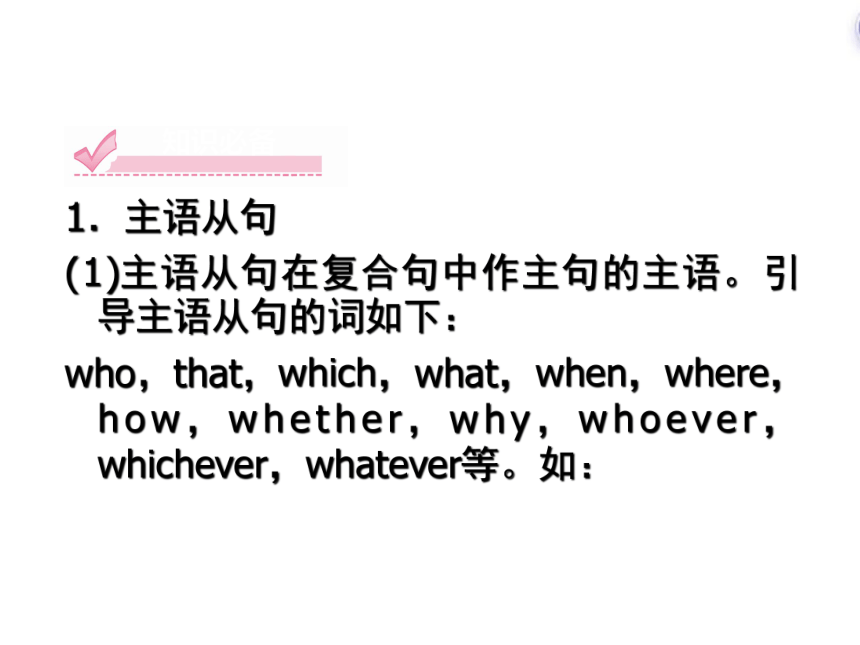
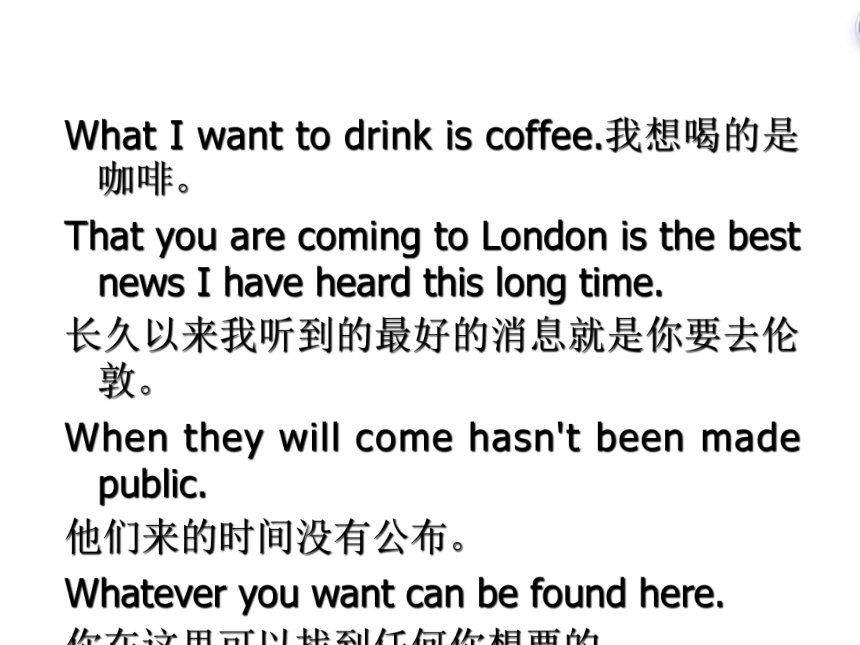
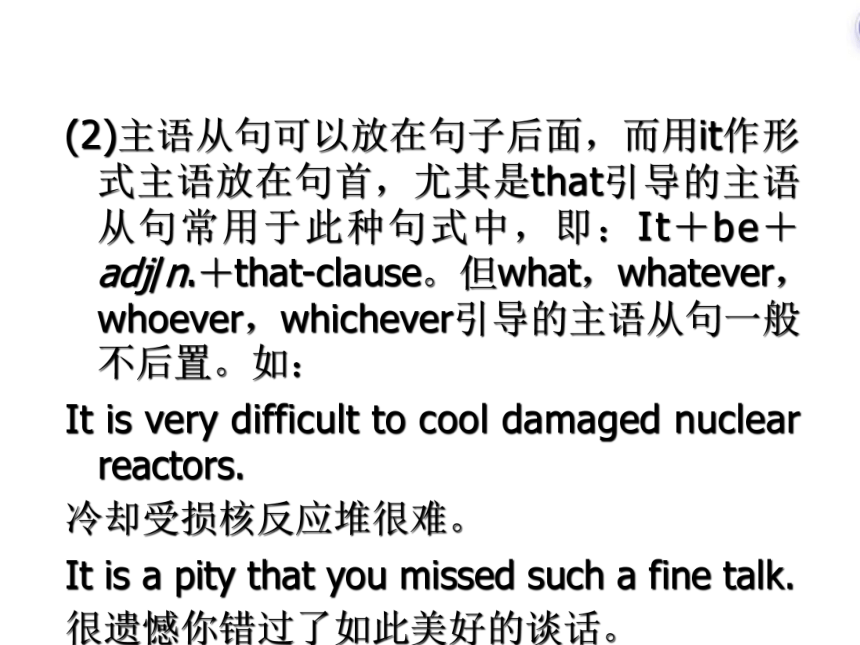
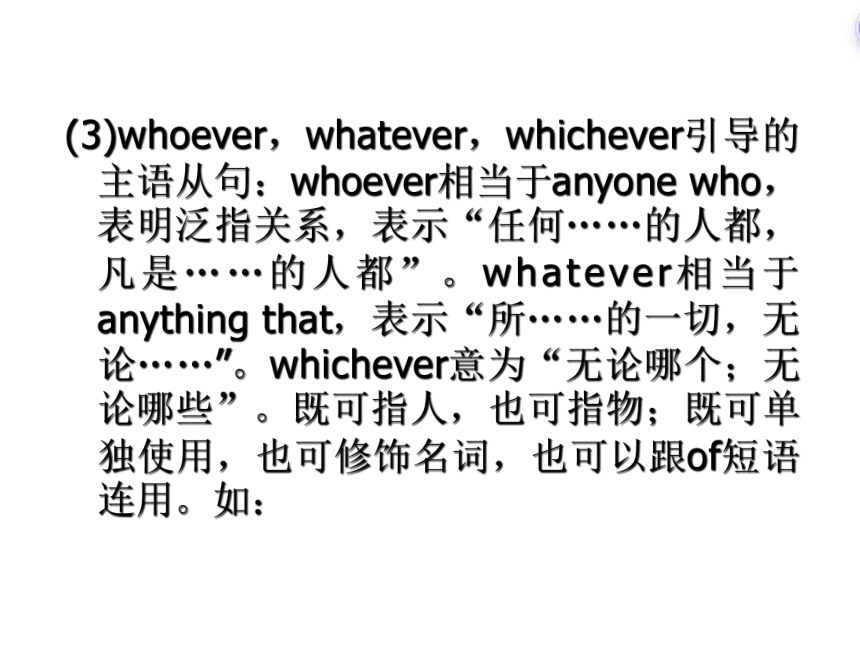
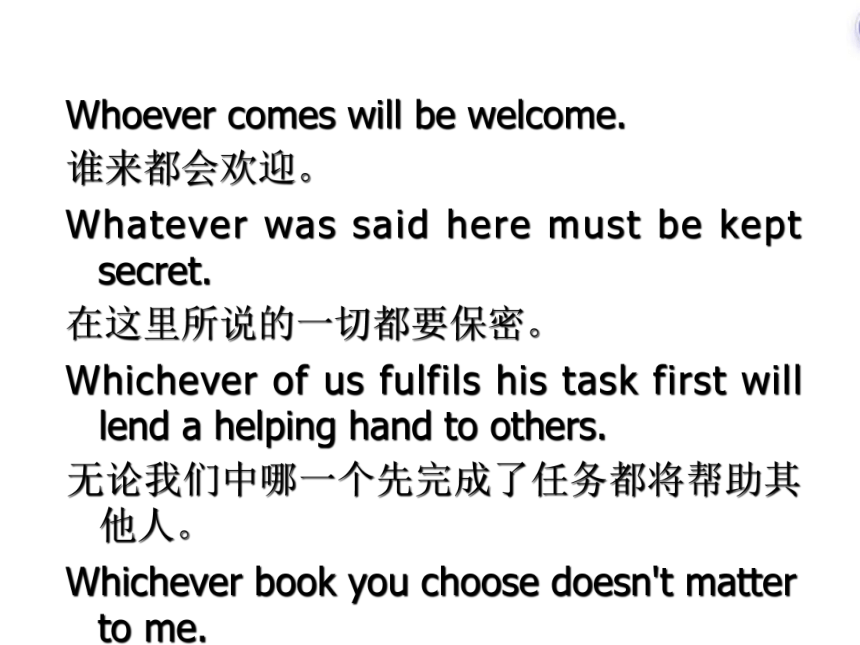
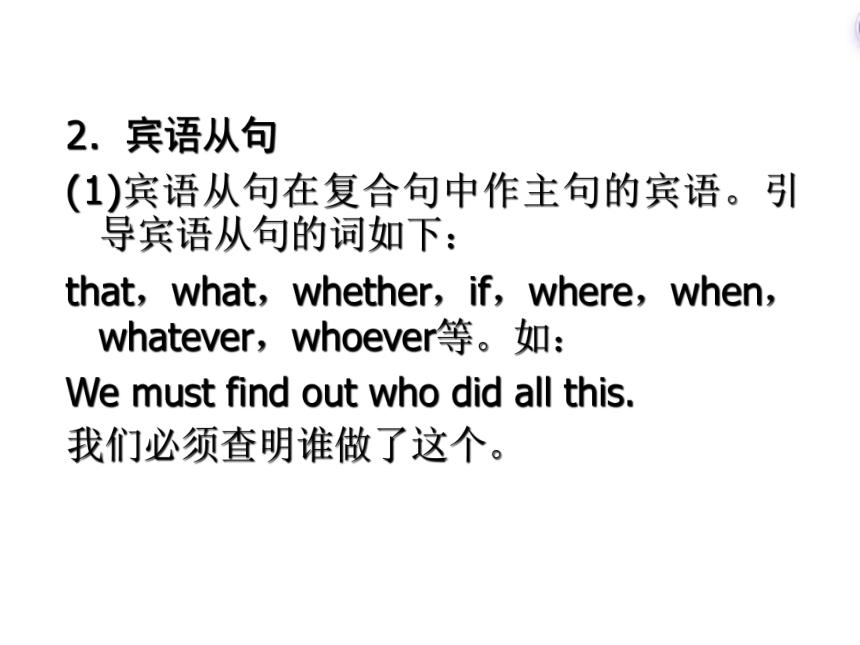
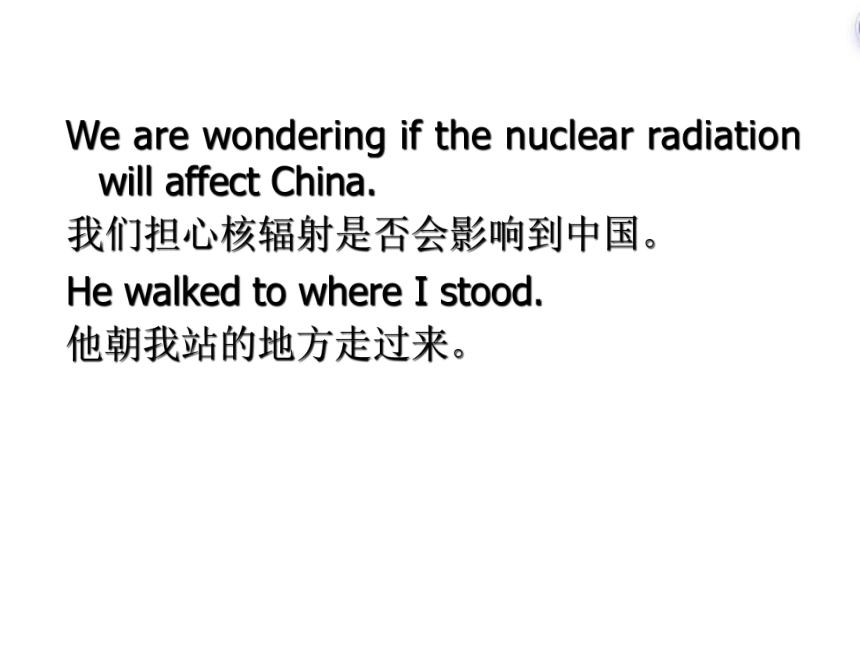
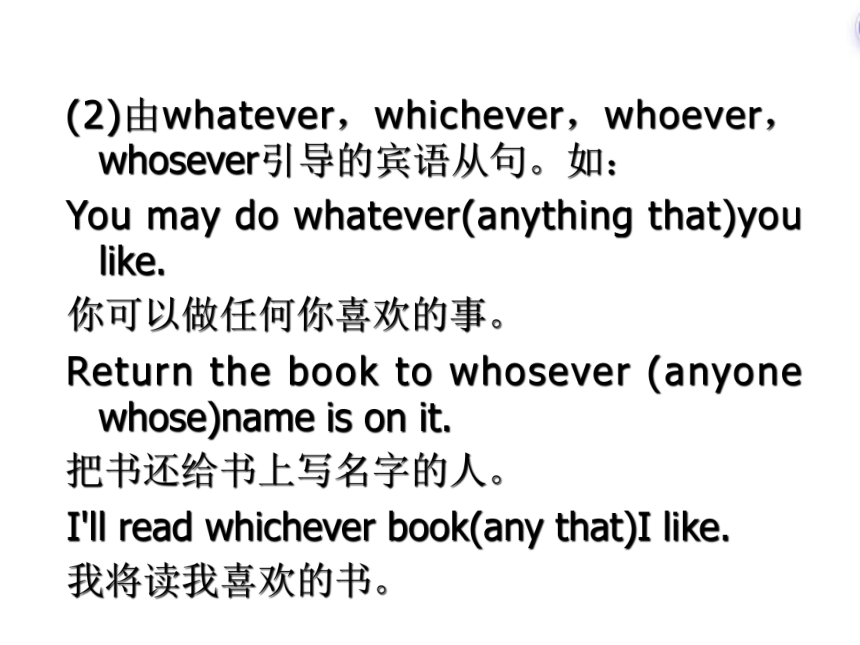
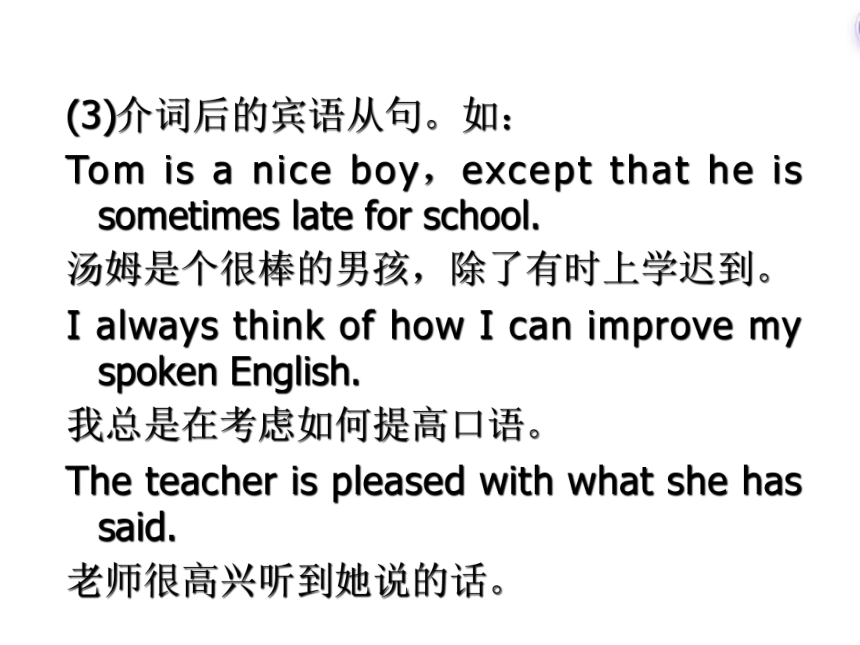
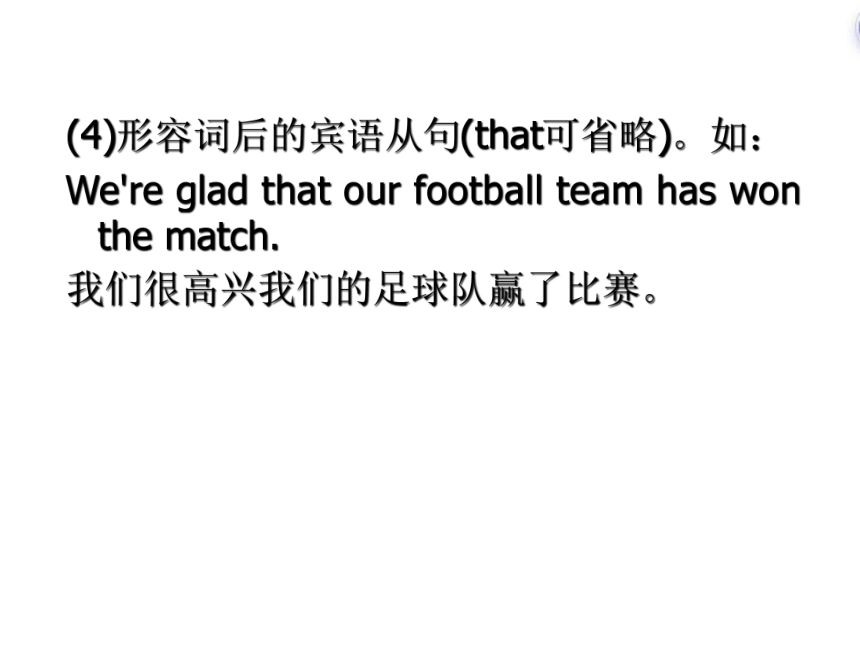
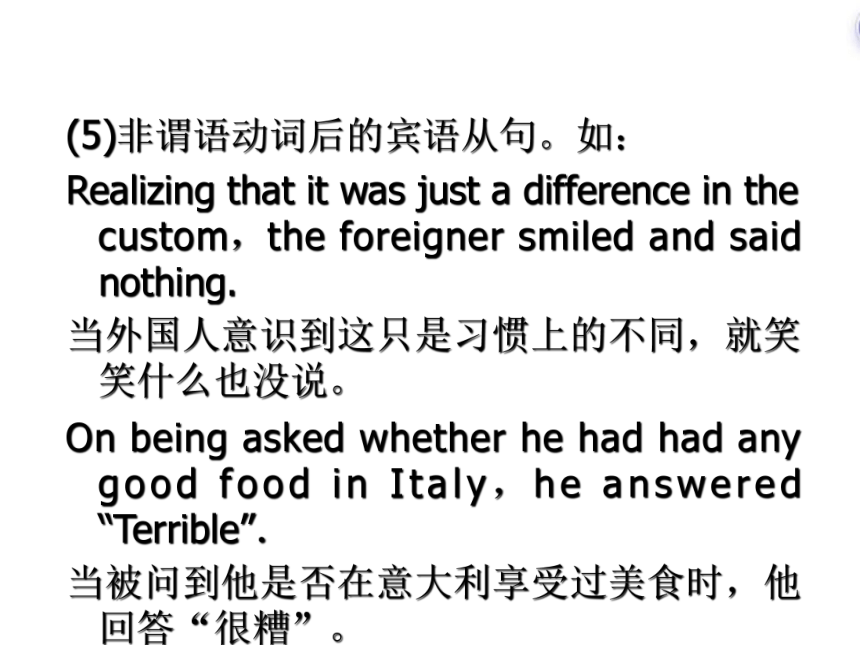
文档简介
(共33张PPT)
语法专项突破
语法专项十 名词性从句
1.主语从句
(1)主语从句在复合句中作主句的主语。引导主语从句的词如下:
who,that,which,what,when,where,how,whether,why,whoever,whichever,whatever等。如:
知识必备
What I want to drink is coffee.我想喝的是咖啡。
That you are coming to London is the best news I have heard this long time.
长久以来我听到的最好的消息就是你要去伦敦。
When they will come hasn't been made public.
他们来的时间没有公布。
Whatever you want can be found here.
你在这里可以找到任何你想要的。
(2)主语从句可以放在句子后面,而用it作形式主语放在句首,尤其是that引导的主语从句常用于此种句式中,即:It+be+adj/n.+that clause。但what,whatever,whoever,whichever引导的主语从句一般不后置。如:
It is very difficult to cool damaged nuclear reactors.
冷却受损核反应堆很难。
It is a pity that you missed such a fine talk.
很遗憾你错过了如此美好的谈话。
(3)whoever,whatever,whichever引导的主语从句:whoever相当于anyone who,表明泛指关系,表示“任何……的人都,凡是……的人都”。whatever相当于anything that,表示“所……的一切,无论……”。whichever意为“无论哪个;无论哪些”。既可指人,也可指物;既可单独使用,也可修饰名词,也可以跟of短语连用。如:
Whoever comes will be welcome.
谁来都会欢迎。
Whatever was said here must be kept secret.
在这里所说的一切都要保密。
Whichever of us fulfils his task first will lend a helping hand to others.
无论我们中哪一个先完成了任务都将帮助其他人。
Whichever book you choose doesn't matter to me.
你选哪本书不关我的事。
2.宾语从句
(1)宾语从句在复合句中作主句的宾语。引导宾语从句的词如下:
that,what,whether,if,where,when,whatever,whoever等。如:
We must find out who did all this.
我们必须查明谁做了这个。
We are wondering if the nuclear radiation will affect China.
我们担心核辐射是否会影响到中国。
He walked to where I stood.
他朝我站的地方走过来。
(2)由whatever,whichever,whoever,whosever引导的宾语从句。如:
You may do whatever(anything that)you like.
你可以做任何你喜欢的事。
Return the book to whosever (anyone whose)name is on it.
把书还给书上写名字的人。
I'll read whichever book(any that)I like.
我将读我喜欢的书。
(3)介词后的宾语从句。如:
Tom is a nice boy,except that he is sometimes late for school.
汤姆是个很棒的男孩,除了有时上学迟到。
I always think of how I can improve my spoken English.
我总是在考虑如何提高口语。
The teacher is pleased with what she has said.
老师很高兴听到她说的话。
(4)形容词后的宾语从句(that可省略)。如:
We're glad that our football team has won the match.
我们很高兴我们的足球队赢了比赛。
(5)非谓语动词后的宾语从句。如:
Realizing that it was just a difference in the custom,the foreigner smiled and said nothing.
当外国人意识到这只是习惯上的不同,就笑笑什么也没说。
On being asked whether he had had any good food in Italy,he answered “Terrible”.
当被问到他是否在意大利享受过美食时,他回答“很糟”。
(6)宾语从句中的形式宾语it。
在“及物动词+宾语+宾语补足语”的结构中,宾语如果是由从句来担任,则通常放在宾补的后面,用形式宾语it来代替它,此时,that一般不可省。如:
I made it clear that I was determined to carry out the plan.
我很清楚,我已下定决心实施这项计划。
(7)宾语从句中的虚拟语气:
①desire愿望,demand要求,insist坚决要求,order命令,request请求,suggest建议,propose提议,建议等词后的宾语从句用虚拟语气。宾语从句的谓语形式:should+do,should可以省略。如:
He insisted that she(should)stay here for another week.
他坚持认为她应该在这再待一周。
They suggested that we(should) start at once.
他们建议我们立即开始。
②wish后的宾语从句用虚拟语气。
I wish I had met him yesterday.
我希望昨天见过他。
3.表语从句
(1)that和what引导的表语从句的区别:
that引导表语从句时,充当连词的作用,没有实际意义,不作句子成分;what引导的表语从句,既充当连接代词的作用,又作句子成分。如:
Our plan is that we'll go there once a week.
我们的计划是我们一周去一次。
That's what he said.那就是他说的话。
(2)引导表语从句时,用whether,不能用if。如:
The question is whether he has signed the contract.(不能用if)
问题是他是否已经签了合同。
(3)reason后面的表语从句用that引导;定语从句用why或that引导。请比较下面两个复合句:
The reason why we don't trust him is that he often lies.
我们不信任他的原因是他经常撒谎。
You must tell him the reason why/that you won't accept his offer.
你必须告诉他你不接受他报价的原因。
(4)由连接副词引导的表语从句。如:
That is where the great writer used to live.
那就是大作家以前住的地方。
That is why the sports meet was put off.
那就是运动会被推迟的原因。
(5)表语从句还可用as,as if/though引导。如:
Things were not as they seemed.
事情并不像他们看到的那样。
It looks as if it is going to rain.
看上去好像要下雨了。
as if引导表语从句时,谓语动词可用陈述语气,也可用虚拟语气。如:
When a pencil is partly in a glass of water,it looks as if itwere broken.(虚拟语气)
当铅笔的一部分在一杯水中时,它看上去像断了。
4.同位语从句
(1)同位语从句常放在fact,news,idea,truth,hope,problem,information,belief,thought,doubt等名词的后面,是对前面的名词作进一步的解释,说明前面的名词的具体的含义。如:
The hope that he may recover is not gone yet.
他恢复的希望还没有破灭。
The problem whether we should continue to do the experiment has been solved.(if不能代替whether来引导同位语从句)
是否我们应该继续做实验的问题已经解决了。
I have no idea when he will come back.
我不知道他将何时回来。
There is no doubt that the nuclear reactor crisis will have a great effect on Japan.
毫无疑问核反应堆危机将对日本产生极大影响。
(2)同位语从句与定语从句的区别:
同位语从句是对前面名词的内容作进一步的解释、说明,引导词that只起引导作用,不在句中作任何成分,一般不可省略。定语从句是对前面名词进行修饰、限制,引导词在句中作一定的句子成分。如:
The news that they had won the game soon spread over the whole school.
他们赢得比赛的消息很快就传遍了整个学校。(此句为同位语从句,进一步解释“the news”的内容)
The news you told me yesterday was really disappointing.
你昨天告诉我的消息真的很令人失望。(此句是定语从句,它指的是“你昨天告诉我的那个消息”)
1.巧借不及物动词,善断连接词。
名词性从句的一个关键点是选用连接代词还是连接副词。如果这个从句中的谓语是不及物动词,后面跟的一定是状语,再根据缺少的意思选择when, where, why或how。如:
技巧点拨
I prefer shutting myself in and listening to music all day on Sundays.
— That's________ I don't agree. You should have a more active life.
A.where B.how
C.when D.what
解析:该句的意思是“那就是我不同意的地方所在”。
“________ I don't agree”是表语从句,该从句的谓语是不及物动词agree(同意),不需要宾语,也不缺少主语,所以此处不可能用连接代词what,而应该用连接副词作状语,根据上下文可知,空格处应该表示“方面;点”,只有where可表达此意。这是一道有极好区分度的试题。
做此类试题,关键要把握好这个引导词要在从句中作什么成分,有很多时候要看这个从句的谓语动词要不要求跟宾语,如果跟宾语要用代词,否则,是状语成分,然后再依据行文逻辑判断是方式,还是地点或者时间。
答案:A
2.火眼金睛识陷阱,巧妙破除障碍物。
有一类这样的高考题,主语或主语从句与谓语部分之间设置了插入语,用以混淆考生对句式的正确判断,这也正是同学们感到头疼的地方,其实这样的插入语是很容易辨认的,它们常是:主语+know/think/believe/suppose/feel/hope...。遇到这类试题,只要把这些插入语去掉,句式就明显了。
The companies are working together to create ________ they hope will be the best means of transport in the 21st century.
A.which
B.that
C.what
D.who
解析:句意:这些公司共同努力,力争创建他们所希望的,将会是21世纪最好的交通工具。及物动词create后面是宾语从句,而该引导词在宾语从句中作主语。they hope是插入语。
答案:C
温
示
提
馨
请做:课时做业(50)
(点击进入)
语法专项突破
语法专项十 名词性从句
1.主语从句
(1)主语从句在复合句中作主句的主语。引导主语从句的词如下:
who,that,which,what,when,where,how,whether,why,whoever,whichever,whatever等。如:
知识必备
What I want to drink is coffee.我想喝的是咖啡。
That you are coming to London is the best news I have heard this long time.
长久以来我听到的最好的消息就是你要去伦敦。
When they will come hasn't been made public.
他们来的时间没有公布。
Whatever you want can be found here.
你在这里可以找到任何你想要的。
(2)主语从句可以放在句子后面,而用it作形式主语放在句首,尤其是that引导的主语从句常用于此种句式中,即:It+be+adj/n.+that clause。但what,whatever,whoever,whichever引导的主语从句一般不后置。如:
It is very difficult to cool damaged nuclear reactors.
冷却受损核反应堆很难。
It is a pity that you missed such a fine talk.
很遗憾你错过了如此美好的谈话。
(3)whoever,whatever,whichever引导的主语从句:whoever相当于anyone who,表明泛指关系,表示“任何……的人都,凡是……的人都”。whatever相当于anything that,表示“所……的一切,无论……”。whichever意为“无论哪个;无论哪些”。既可指人,也可指物;既可单独使用,也可修饰名词,也可以跟of短语连用。如:
Whoever comes will be welcome.
谁来都会欢迎。
Whatever was said here must be kept secret.
在这里所说的一切都要保密。
Whichever of us fulfils his task first will lend a helping hand to others.
无论我们中哪一个先完成了任务都将帮助其他人。
Whichever book you choose doesn't matter to me.
你选哪本书不关我的事。
2.宾语从句
(1)宾语从句在复合句中作主句的宾语。引导宾语从句的词如下:
that,what,whether,if,where,when,whatever,whoever等。如:
We must find out who did all this.
我们必须查明谁做了这个。
We are wondering if the nuclear radiation will affect China.
我们担心核辐射是否会影响到中国。
He walked to where I stood.
他朝我站的地方走过来。
(2)由whatever,whichever,whoever,whosever引导的宾语从句。如:
You may do whatever(anything that)you like.
你可以做任何你喜欢的事。
Return the book to whosever (anyone whose)name is on it.
把书还给书上写名字的人。
I'll read whichever book(any that)I like.
我将读我喜欢的书。
(3)介词后的宾语从句。如:
Tom is a nice boy,except that he is sometimes late for school.
汤姆是个很棒的男孩,除了有时上学迟到。
I always think of how I can improve my spoken English.
我总是在考虑如何提高口语。
The teacher is pleased with what she has said.
老师很高兴听到她说的话。
(4)形容词后的宾语从句(that可省略)。如:
We're glad that our football team has won the match.
我们很高兴我们的足球队赢了比赛。
(5)非谓语动词后的宾语从句。如:
Realizing that it was just a difference in the custom,the foreigner smiled and said nothing.
当外国人意识到这只是习惯上的不同,就笑笑什么也没说。
On being asked whether he had had any good food in Italy,he answered “Terrible”.
当被问到他是否在意大利享受过美食时,他回答“很糟”。
(6)宾语从句中的形式宾语it。
在“及物动词+宾语+宾语补足语”的结构中,宾语如果是由从句来担任,则通常放在宾补的后面,用形式宾语it来代替它,此时,that一般不可省。如:
I made it clear that I was determined to carry out the plan.
我很清楚,我已下定决心实施这项计划。
(7)宾语从句中的虚拟语气:
①desire愿望,demand要求,insist坚决要求,order命令,request请求,suggest建议,propose提议,建议等词后的宾语从句用虚拟语气。宾语从句的谓语形式:should+do,should可以省略。如:
He insisted that she(should)stay here for another week.
他坚持认为她应该在这再待一周。
They suggested that we(should) start at once.
他们建议我们立即开始。
②wish后的宾语从句用虚拟语气。
I wish I had met him yesterday.
我希望昨天见过他。
3.表语从句
(1)that和what引导的表语从句的区别:
that引导表语从句时,充当连词的作用,没有实际意义,不作句子成分;what引导的表语从句,既充当连接代词的作用,又作句子成分。如:
Our plan is that we'll go there once a week.
我们的计划是我们一周去一次。
That's what he said.那就是他说的话。
(2)引导表语从句时,用whether,不能用if。如:
The question is whether he has signed the contract.(不能用if)
问题是他是否已经签了合同。
(3)reason后面的表语从句用that引导;定语从句用why或that引导。请比较下面两个复合句:
The reason why we don't trust him is that he often lies.
我们不信任他的原因是他经常撒谎。
You must tell him the reason why/that you won't accept his offer.
你必须告诉他你不接受他报价的原因。
(4)由连接副词引导的表语从句。如:
That is where the great writer used to live.
那就是大作家以前住的地方。
That is why the sports meet was put off.
那就是运动会被推迟的原因。
(5)表语从句还可用as,as if/though引导。如:
Things were not as they seemed.
事情并不像他们看到的那样。
It looks as if it is going to rain.
看上去好像要下雨了。
as if引导表语从句时,谓语动词可用陈述语气,也可用虚拟语气。如:
When a pencil is partly in a glass of water,it looks as if itwere broken.(虚拟语气)
当铅笔的一部分在一杯水中时,它看上去像断了。
4.同位语从句
(1)同位语从句常放在fact,news,idea,truth,hope,problem,information,belief,thought,doubt等名词的后面,是对前面的名词作进一步的解释,说明前面的名词的具体的含义。如:
The hope that he may recover is not gone yet.
他恢复的希望还没有破灭。
The problem whether we should continue to do the experiment has been solved.(if不能代替whether来引导同位语从句)
是否我们应该继续做实验的问题已经解决了。
I have no idea when he will come back.
我不知道他将何时回来。
There is no doubt that the nuclear reactor crisis will have a great effect on Japan.
毫无疑问核反应堆危机将对日本产生极大影响。
(2)同位语从句与定语从句的区别:
同位语从句是对前面名词的内容作进一步的解释、说明,引导词that只起引导作用,不在句中作任何成分,一般不可省略。定语从句是对前面名词进行修饰、限制,引导词在句中作一定的句子成分。如:
The news that they had won the game soon spread over the whole school.
他们赢得比赛的消息很快就传遍了整个学校。(此句为同位语从句,进一步解释“the news”的内容)
The news you told me yesterday was really disappointing.
你昨天告诉我的消息真的很令人失望。(此句是定语从句,它指的是“你昨天告诉我的那个消息”)
1.巧借不及物动词,善断连接词。
名词性从句的一个关键点是选用连接代词还是连接副词。如果这个从句中的谓语是不及物动词,后面跟的一定是状语,再根据缺少的意思选择when, where, why或how。如:
技巧点拨
I prefer shutting myself in and listening to music all day on Sundays.
— That's________ I don't agree. You should have a more active life.
A.where B.how
C.when D.what
解析:该句的意思是“那就是我不同意的地方所在”。
“________ I don't agree”是表语从句,该从句的谓语是不及物动词agree(同意),不需要宾语,也不缺少主语,所以此处不可能用连接代词what,而应该用连接副词作状语,根据上下文可知,空格处应该表示“方面;点”,只有where可表达此意。这是一道有极好区分度的试题。
做此类试题,关键要把握好这个引导词要在从句中作什么成分,有很多时候要看这个从句的谓语动词要不要求跟宾语,如果跟宾语要用代词,否则,是状语成分,然后再依据行文逻辑判断是方式,还是地点或者时间。
答案:A
2.火眼金睛识陷阱,巧妙破除障碍物。
有一类这样的高考题,主语或主语从句与谓语部分之间设置了插入语,用以混淆考生对句式的正确判断,这也正是同学们感到头疼的地方,其实这样的插入语是很容易辨认的,它们常是:主语+know/think/believe/suppose/feel/hope...。遇到这类试题,只要把这些插入语去掉,句式就明显了。
The companies are working together to create ________ they hope will be the best means of transport in the 21st century.
A.which
B.that
C.what
D.who
解析:句意:这些公司共同努力,力争创建他们所希望的,将会是21世纪最好的交通工具。及物动词create后面是宾语从句,而该引导词在宾语从句中作主语。they hope是插入语。
答案:C
温
示
提
馨
请做:课时做业(50)
(点击进入)
